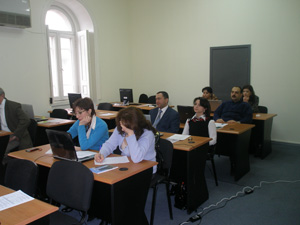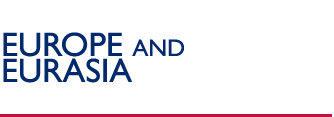Azerbaijan’s Health Specialists, Officials Embrace Evidence-Based Medicine
“In the second part of the 20th century, medical science began to use clinical trials to define whether or not treatment methods were working. Those studies accumulated over time, building a foundation for development of evidence-based medicine (EBM),” explains Vasiliy Vlasov, a professor at Sechenov Moscow Medical Academy and a renowned EBM expert.
Vlasov was invited to Baku by the USAID-funded Primary Health Care Strengthening (PHCS) project to present EBM fundamentals at the recent “Introduction to Evidence-Based Medicine” workshop for Azerbaijani health officials and specialists. Speakers from the Ministry of Health, the Centre of Public Health and Reform, and USAID expressed interest in developing EBM in Azerbaijan. The Deputy Minister of Health, Sanan Kerimov, stressed its importance in developing high-quality, modern clinical treatment protocols—and shared his hopes of Azerbaijan becoming a world leader in this regard.
 |
The five-day “Introduction to Evidence-Based Medicine” workshop in Baku brought together health officials and specialists from various institutions. Developing a basis for evidence-based medicine and the introduction of clinical treatment protocols is a key step in improving primary healthcare in Azerbaijan.
Photo Credit: Abt Associates |
Participants in the intensive five-day workshop represented the Ministry of Health’s Centre of Public Health and Reform, the World Bank’s Health Reform Project Implementation Unit, the Medical University, the Institute of Traumatology, the Institute of Lung Diseases, the Institute of Cardiology, the Institute of Pediatrics, the Institute of Obstetrics and Gynecology, and the Centre of the Analytical Expertise of Drugs. The participants learned how to obtain reliable information on modern medical trends and achievements, and were able to apply new skills computer-based practical exercises.
“We learned how to formulate good clinical questions and develop search strategies, how to evaluate clinical practice guidelines and use EBM in health care management,” said Tahmina Tagizadeh, the head of the Projects Coordination Department of the Centre of Public Health and Reform. “At the end of the workshop, we shared projects we have been researching over the five days with each other and received feedback from colleagues and the tutor.”
Developing the foundation for evidence-based medicine and the introduction of clinical treatment protocols is key to improving the quality of primary healthcare services in Azerbaijan, the overarching PHCS goal.
“Development of evidence-based medicine is closely related to the development of primary health care,” noted Vlasov. “Primary healthcare doctors encounter many different diseases. To treat them better, health specialists need lots of additional information. The shortest way to such information is evidence-based medicine.”
“I think this was the right time for such a workshop,” said Dr. Azad Ahmadov, Azerbaijan’s national EBM coordinator. “As clinical protocols are being developed in Azerbaijan, this workshop [enabled] us not only to systematize our knowledge of evidence-based medicine, [but] also to learn a lot of new information. And now we look forward to participating in the next training.”
Back to Top ^ |


